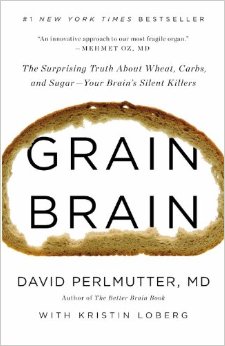Grain Brain Review
Published on September 8, 2015 by Dr. Caitlin Gordon
 I want to share my Grain Brain review and inspire you to read it as well! Let me start by saying that I had this book for about 4 months before I even opened it. I knew it was going to change how I thought about some foods, and I wasn’t sure I was ready to feel more guilt around eating a bowl of rice. I also worried it would be dense and tedious to read. I was wrong. This book is an International Bestseller for a reason. It is eye opening!
I want to share my Grain Brain review and inspire you to read it as well! Let me start by saying that I had this book for about 4 months before I even opened it. I knew it was going to change how I thought about some foods, and I wasn’t sure I was ready to feel more guilt around eating a bowl of rice. I also worried it would be dense and tedious to read. I was wrong. This book is an International Bestseller for a reason. It is eye opening!
Grain Brain is very easy to read. It is very well sourced, and researched, but not overly scientific in language so that the average person won’t get lost in lingo. It does help to have a health background or some knowledge of nutrition. The author, Dr. David Perlmutter, a neurologist, assumes that the reader has already read a lot of the hype about gluten being problematic for your waistline and blood sugar. He makes the case for grains doing damage to your brain. He also explains why brain health should be something we pay a lot more attention to. I was in the camp of folks who figured your brain function naturally declines as you age, and there isn’t a whole lot you can do about it besides try to eat well and stay healthy, but believed most of it is genetic and beyond one’s control. Dr. Perlmutter explains why this is completely wrong, and a major problem in the way we think about health. Your brain can be as sharp and clear at 90 as it is at 40. Truly, there are no physiological reasons why it should start to decline with age like so many experience. What causes degeneration and disease of the brain are largely factors within our control. Primarily: exercise, diet, and nutrition.
Grain Brain Review Big Takeaways
- You need to make sure your Vitamin D level is above 50 or start taking a supplement, today! Most Dr.’s will test your vitamin D if you ask. If yours won’t, come see me and I’ll order it for you.
- High cholesterol is not the result of a high-fat diet, does not cause heart disease, and your chances of avoiding a heart attack do NOT improve when you take statin medication. Statin medication has major risks and should be a very last resort.
- Depression, anxiety, bipolar, ADHD, and migraines can all be caused by gluten sensitivity.
- You can be celiac and have ZERO digestive symptoms, only neurological ones.
 Depression, anxiety, bipolar, and ADHD are all linked to inflammation in the brain. Treating inflammation often improves these conditions more effectively and safely than trying to rebalance neurotransmitters or taking medication.
Depression, anxiety, bipolar, and ADHD are all linked to inflammation in the brain. Treating inflammation often improves these conditions more effectively and safely than trying to rebalance neurotransmitters or taking medication.- Everyone should be taking good quality fish oil or eating Wild Alaskan Salmon 3-4x week. We all need more Omega 3’s. Good sources: raw walnuts, flaxseed, chia seeds, avocados, oils from all these foods, sardines, anchovies, and eggs.
- Exercise is just as important for your brain as it is for your butt and your heart. Exercising actually makes you smarter.
- Fasting can boost brain cell growth, and you only need to go for 1-2 days at a time.
Grain Brain Review Critiques
 Not everyone feels good on a grain-free diet and it isn’t necessary for everyone to avoid grains to be in great health. This book takes a very hard line, saying grain-free is best for all. I disagree.
Not everyone feels good on a grain-free diet and it isn’t necessary for everyone to avoid grains to be in great health. This book takes a very hard line, saying grain-free is best for all. I disagree.- Gluten, while inflammatory for most bodies, is not harmful in small amounts for some people. Some people process gluten well. Baking your own bread, consuming gluten from non-GMO organic sources, consuming gluten in bread like sourdough, where yeasts help break down the sticky protein, and eating wheat products abroad that are less processed/modified all improve your chances of eating gluten without reacting. That being said, if you are sensitive, you need to take it seriously. Eating something that inflames your system, even if you don’t always feel bad from it, is causing long-term damage. You don’t want that slow burn of inflammatory processes–it will lead to chronic disease.
- Like all books with an agenda (all books), this one takes data and interprets it to fit the message: grains cause brain inflammation, which leads to neurological and degenerative diseases. Data can be interpreted to fit many agendas, so I always recommend listening to your body. Do your symptoms improve on a low or no-grain diet? Does your labwork improve? The proof is always in the pudding!
Who Should Read Grain Brain?
- You have a family history of Parkinson’s, Alzheimer’s, High Cholesterol or Dementia.
- You have a Parkinson’s, Alzheimer’s, High Cholesterol, Diabetes, Migraines, Depression, Anxiety, Epilepsy, Bipolar, ADD/ADHD, or Dementia.
- Someone in your family has celiac or believes they are gluten-sensitive.
- You are on medication for anxiety, depression, high cholesterol, diabetes, migraines, bipolar disorder, ADD, or seizures.
- You’re interested in nutrition and healthcare.
This post is part of the Get Inspired Must-Read/Must-Watch List.
Learn More
- Inspired to get the book after reading my Grain Brain review? Order Grain Brain Online
- Borrow Grain Brain from the Amaluna Office
- Read about Dr. David Perlmutter
- Gluten-Free Why and Why Not
- Grain-Free Recipes
- Fascinating Podcast on the Gluten-Free trend






